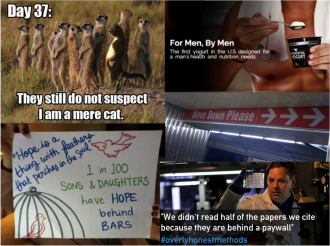 Proofreading
Proofreading
Typos lurk, mock, elude, persist. This Friday, I offer some quick(ish) tips for effective proofreading*:
- Remember: proofing is a final step. This is not the time to edit, reorganize, or create new subsections. We’re past that.
- Do not proofread your own work if at all possible. You can no longer spot errors when you already know the text. Find a buddy and exchange proofing for proofing (or pies, pen-lathing, vacuuming, etc.). If you’re an academic, try to find a non-academic proofer-friend.
- Your proofer should read your piece quickly, as though it’s in a magazine. You don’t want this to be analyzed (see: #1, this is not editing). As with editing, most mistakes will jump out if the reader has to pause in the flow of reading.
- If it absolutely has to be as perfect as you can make it (say, in a cover letter for a job application, book proposal, or grant application), your proofer will need to take a second pass, and this one’s the kicker. You should probably paint their house. They need to read it backwards. Yes, it sounds insane, but it works. This perspective allows a focus on just the words (that is, you can’t skim), and it’s nearly guaranteed new errors will be uncovered. When you have time to waste, try it on the last recommendation letter you asked for or wrote.
Now, on to the Roundup! Please add your proofing tips in the comments. I always need mre. More. Ugh.
Features:
“Juvenile Lifers, Learning to Lead,” by Michelle Inderbitzin, Trevor Walraven, and Joshua Cain. In which two inmates and their professor write about the experiences of those sentenced to life in prison before they could vote, buy cigarettes, or rent a car (let alone the hat trick), and how they work to grow into leadership behind the walls.
The Editors’ Desk:
“Facebook and the Freshman Experience,” by Doug Hartmann. In which a man all-too-familiar with college freshmen recommends some reading.
Citings & Sightings:
“Making Dairy Manly,” by Andrew Wiebe. In which, taking a cue from an old Conan sketch, a company tries to alleviate the terrible embarrassment suffered by all XYers in the dairy aisle.
“Movin’ on… Down,” by Evan Stewart. In which housing mobility takes a turn for the worse and Evan gets to show off his skill with song lyrics.
Office Hours:
“Shai Dromi on Beggars and Morality,” with Kyle Green. In which pleas for spare change spur introspection.
Teaching TSP:
“Beggars & Morality,” by Kia Heise. In which Heise shares a series of questions to stimulate classroom discussion on panhandling and sociological observation.
A Few from the Community Pages:
- Sociological Images. Cultural norms get in the way of calculus, Oxy—and many, many other colleges—is discounting sexual assault, and #overlyhonestmethods is both true and a little terrifying because it shakes our false sense of scientific certainty.
- Cyborgology. “It’s as if a TED conference smashed headfirst into a hackathon and then fell into an NGO strategy summit.” “Okay, so let’s get it out front that we all have a lot of feelings about stuff.” “It might be fun to play Thoreau and sit in judgment of what the Internet does to people, but I’d rather be a cyborg than a romantic.”
- Sociology Lens. Cheryl Llwellyn shares the good—and bad—news about HIV, Candace Smith outlines some criminological terminology, and Amanda talks nude bodies: representations, stigma, and gender.
- Thick Culture. The filibuster! Don’t call it a comeback. And why not learn from all those talks you attend? José did!
Scholars Strategy Network:
“What Can U.S. Presidents Accomplish in a Second Term?” by Daniel Paul Franklin. Obama: take notes.
“Do New Communications Media—Like the Internet—Hurt Individuals and Society?” by Joli Jensen. Is all that hand-wringing worth it? I mean, you’re going to need so much moisturizer.
*NB: This column does not have a proofreader, unless you count a rather needy rat terrier that just took the “z” key off the laptop in an attempt to write some sort of doggie manifesto. Please, be kind.

Comments 3
Kathe — March 9, 2013
Letta -- love the 'read it backwards' tip. I teach that to my students and urge them to use it on my tests -- read my questions backwards. Forwards, there is a flow to them, which may or may not make the questions correct, but backwards, they have to stop at nearly every word.
Those who try it, swear by it!
Kathe — March 11, 2013
Letta -- trying to distance myself from my writing is hard, so time works for me. I try to leave something for 10+ days if I can before trying to self-edit. This is old advice; I have read it/heard it many times, but where the advice really "got" to me was when Stephen King talked about this in "On Writing."